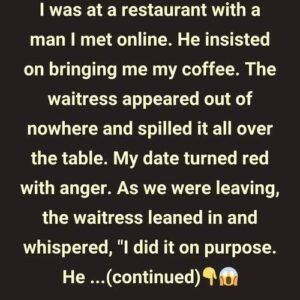I used to think betrayal was something that belonged to other people’s lives. It was the kind of thing you heard whispered at a coworker’s lunch table or saw as a shocking twist on some TV drama. It wasn’t supposed to touch the life I had — quiet, ordinary, and built on trust.
But betrayal doesn’t knock on your door or give you a warning. It slips in quietly, sits down beside you, and calls itself your best friend.
For five years, Aaron and I lived in a small, sunlit house that always smelled faintly of coffee in the mornings and garlic bread on Friday nights. We didn’t have much, but we had routines that felt like ours — slow Saturday mornings spent reading in bed, pizza nights on the couch with the TV flickering in the dark, and inside jokes that could make us laugh until our sides hurt. It was steady. Real. Safe.
And through all of it, there was Tessa. She wasn’t just my best friend — she was practically woven into the fabric of my life. Since we were sixteen, she’d been the one I could turn to for anything. She knew my coffee order without asking, and I knew the exact way her voice would crack when she laughed too hard. She stood next to me at my wedding, mascara smudged from crying when I said “I do.” She’d been there for every high and low, so when I imagined the rest of my life, she was always part of it.
When I found out I was pregnant, it felt like everything was falling into place. I pictured Aaron and me raising our child in that same little house, Tessa coming over with bags of baby clothes and toys, claiming the title of honorary aunt with pride. It felt like the beginning of something beautiful.
The first signs were so small I almost missed them. Aaron stopped laughing at our jokes. He worked later and later, and when he came home, his kisses were quick, distracted. His texts turned short and distant, replies that said nothing but filled the space. Some nights, he’d lie next to me without a word, as if we were two strangers who just happened to share a bed.
One night, lying in the dark with my hand resting on my growing belly, I called Tessa. “I think he’s pulling away from me,” I whispered, my throat tight. “It’s like… he’s already gone.”
“You’re just hormonal, Liv,” she said gently, her voice the same steady tone that had soothed me through so many past storms. “He loves you. You’ve both got a lot going on.”
I wanted to believe her. I needed to believe her.
But then the day came that split my life in two.
It started with a strange pressure in my stomach that morning, a dull ache I tried to ignore. By nightfall, I was in a hospital bed under harsh fluorescent lights, Aaron sitting stiffly beside me as the doctor’s words shattered the air.
No heartbeat.
No baby.
The grief was like a tidal wave, swallowing me whole. I sobbed until my throat was raw, reaching for Aaron’s hand. He let me take it, but it was limp in mine. No tears. No words. Just silence, as though he were waiting for something else entirely.
A month later, at the breakfast table, he told me he wasn’t happy. Said it as if he were announcing the weather.
“I’m not happy anymore, Liv.”
I stared at him, my coffee cooling between my hands. “What?”
“I haven’t been happy in a long time,” he said, looking past me toward the window.
“Since the miscarriage?” My voice cracked.
“It’s not just that.”
A bitter laugh escaped before I could stop it. “You barely held my hand in the hospital. You looked like you were waiting for a bus, not mourning our child.”
He pushed his chair back, grabbed his keys. “I’m staying somewhere else for a while.”
He didn’t say goodbye.
And not long after, Tessa vanished too. First, she missed a few calls. Then my texts went unanswered. One day, she blocked me completely — phone, social media, everything. No fight, no explanation.
Until my mother called one evening and said softly, “Honey… I think you need to see this.”
She sent me a link to Tessa’s Instagram.
I opened it, and my stomach dropped.
There they were. Aaron and Tessa. Arms around each other, kissing on a beach, drinks in hand, their smiles wide and careless. Post after post — ski trips, candlelit dinners, vineyard weekends — each one a photograph of a life they’d built while mine was still smoldering. And the timestamps told the truth: it hadn’t started after we split. It had been happening all along.
The betrayal burned.
But instead of falling apart, I went cold and clear. I took the evidence — every post, every timestamp, every comment — and handed it to my lawyer. When the divorce was final, I walked away with the house, half of our assets, and the satisfaction of knowing that his picture-perfect little fantasy had cracks he couldn’t hide. He moved in with Tessa, but the cozy townhouse and grieving-husband image were gone.
The months after were hard. Some days I barely got out of bed. I doubted if I’d ever trust anyone again. But slowly, life seeped back in.
A year later, I met Noah. He was quiet, steady, with a kindness that didn’t need to announce itself. When I told him my story, I braced for pity or awkwardness. Instead, he said, “You deserved so much better.” And for the first time, I believed it.
We built something different. Gentle, honest, full of laughter. We married in a small garden surrounded by wildflowers. When our daughter, Hazel, was born, I cried because I’d made it through the storm to this warm, bright shore.
Three years after Aaron walked out, fate handed me a moment I didn’t know I wanted.
It was a rainy Tuesday evening when I stopped for gas on the edge of town. The station’s lights buzzed faintly, casting everything in a sickly yellow glow. I was filling my tank when I saw them.
Aaron and Tessa.
Only they weren’t the golden couple from Instagram anymore. Their car was an old, rusting sedan. Tessa stood outside in a hoodie, hair unwashed, rocking a crying baby with a frustrated grimace. Inside, Aaron was at the counter, sliding his card through the reader.
“Declined,” the cashier said flatly.
“Just run it again,” Aaron snapped.
“I’ve already tried three times.”
Tessa came in, baby still wailing. “Seriously, Aaron? We don’t even have gas money?”
“I told you things were tight,” he muttered.
“Oh, so this is my fault?” she shot back. “Maybe if you could hold down a job for longer than six months—”
“Don’t start,” he warned.
The air between them was heavy with bitterness.
And then, with no idea I was there, Tessa’s voice dropped to a hiss. “God, I gave up everything for you.”
Aaron’s reply was cold. “Well, maybe you shouldn’t have.”
Something in her face crumpled. And then she muttered the words that felt like the final stitch in a wound I’d long since closed.
“You know what? I think Liv got the better end of the deal.”
I smiled then. Not with spite. Not with gloating. Just a quiet, certain smile.
I left them there, arguing under the flickering lights, and drove home.
To Noah. To Hazel. To laughter, bedtime stories, and the kind of love that doesn’t vanish when life gets hard.
And I didn’t look back.





